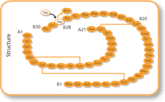Biosimilars
Biosimilar interchangeability and emerging treatment strategies for IBD
Biosimilar development and utilization, as well as non-biological oral agents with unique pathological targets, will continue to dominate efforts to improve patient access and reduce the overall cost of care as non-surgical treatments for Crohn’s disease and ulcerative colitis in adults and children. Therapeutic drug monitoring, combined with inflammatory biomarkers, have become the standard of care to assess effectiveness.
Human insulin ‘similar biologic’ InsuTrend launched in India
India-based company Anthem Biosciences (AnthemBio) announced that it has launched its human insulin ‘similar biologic’ InsuTrend in India.
Pharmacist-driven biosimilar substitution saves money
A study of pharmacist-driven substitution of brand-name biologicals with biosimilars has shown that this can lead to substantial cost savings in the setting of a community oncology practice.
Alvotech and Celltrion proceed with adalimumab and rituximab biosimilars
Iceland-based Alvotech has reached the primary completion date in a switching study for its adalimumab biosimilar, AVT02, while Celltrion Healthcare has released real-world data on the safety and efficacy of its rituximab biosimilar, Truxima, supporting its use as a treatment for lymphoma.
Biosimilars, innovation in the treatment of chronic disease
Biological therapies have meant a significant advance in the way of treating various chronic conditions such as cancer, rheumatoid arthritis, multiple sclerosis. However, they have brought with them high costs for health systems that have been channelled through supply programmes of this type of drugs, in the case of the Dominican Republic, through the High Cost Medicines Programme.
Biosimilars of insulin aspart
Last update: 27 August 2021
Insulin aspart is a type of manufactured insulin used to treat type 1 and type 2 diabetes. It has a more rapid onset and a shorter duration of activity than normal human insulins.
FDA approves first interchangeable insulin glargine biosimilar
In a landmark decision, the US Food and Drug Administration (FDA) has approved its first interchangeable biosimilar.
Biosimilars applications under review by EMA – July 2021
The European Medicines Agency (EMA) is the body responsible for approval of biosimilars within the European Union (EU). A legal framework for approving biosimilars was established in 2003. Approval of biosimilars is based on an abbreviated registration process, which allows biosimilars manufacturers to provide a reduced package of information compared to originator drugs, provided they can prove ‘similarity’ to the originator or reference drug.
Canadian study says drug formulary policies do not improve biosimilar uptake
Traditional public drug programme formulary policies alone are not effective in affecting biosimilar uptake, according to a Canadian study published in JMCP [1].
Clinical trials begin for Bio-Thera’s golimumab copy biological
China-based Bio-Thera Solutions (Bio-Thera) have begun a phase III clinical trial for BAT2506, copy biological of the anti-inflammatory molecule Simponi (golimumab).













